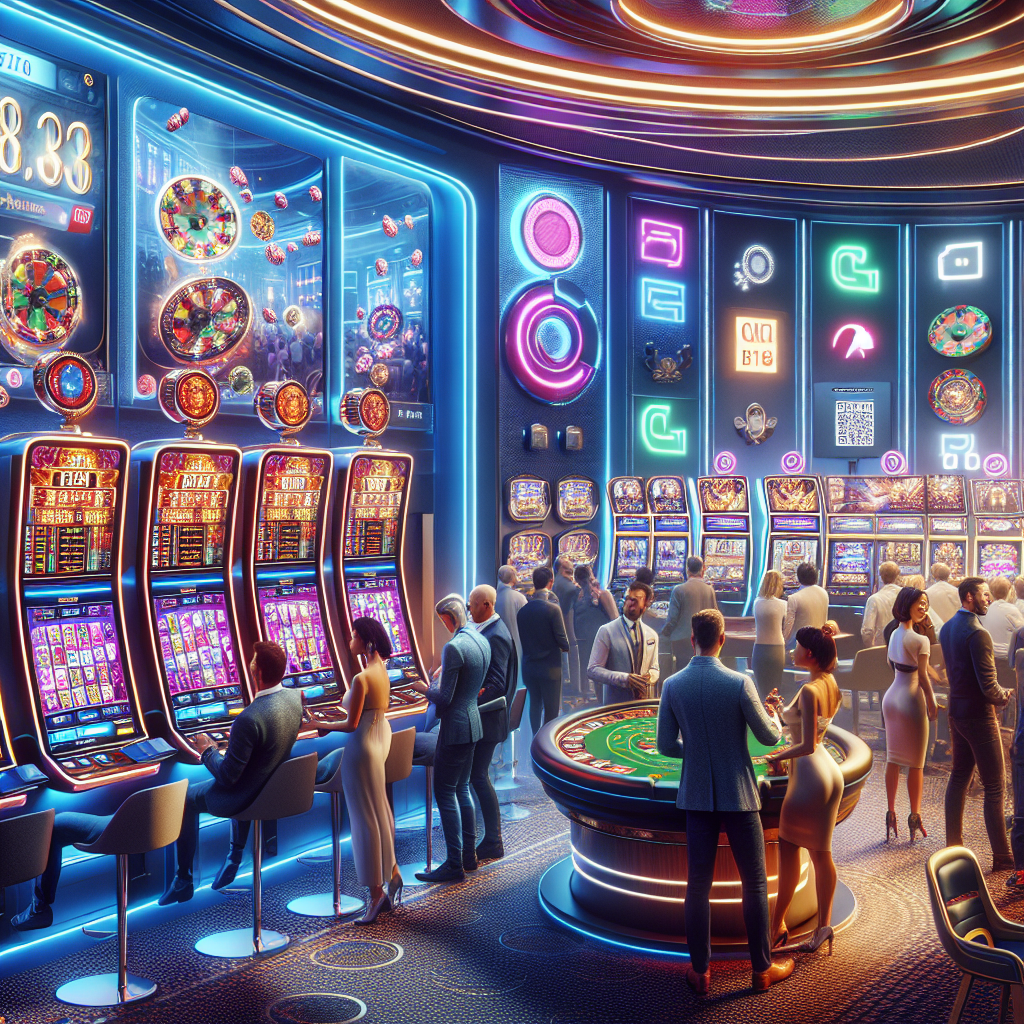The European casino industry is undergoing a remarkable transformation, adapting to the digital age with innovative technologies and new regulatory landscapes. As we navigate through 2023, the sector is witnessing a flurry of trends that are setting the stage for a new era of gambling. From the digitalization of betting platforms to the integration of blockchain technology, and an increased emphasis on responsible gaming, the industry’s evolution is both dynamic and complex. This article delves into the latest trends shaping Europe’s casino market, offering insights into the future of gambling on the continent.
Navigating Through Europe’s Casino Evolution
The European casino industry is not what it used to be; it’s evolving at an unprecedented pace, driven by technological advancements and changing consumer behaviors. Traditional brick-and-mortar casinos are increasingly integrating digital solutions to enhance the customer experience, offering everything from mobile apps to virtual reality casino games. This hybrid approach caters to a broader audience, combining the thrill of physical casinos with the convenience of online gambling.
Simultaneously, the industry is witnessing a shift in demographics. Younger generations, particularly Millennials and Gen Z, are showing a preference for online and mobile platforms, prompting casinos to rethink their engagement strategies. In response, European casinos are adopting more interactive and immersive technologies, aiming to bridge the gap between traditional gambling and the digital era.

Moreover, the advent of artificial intelligence (AI) and machine learning is transforming the casino landscape. These technologies are being employed to personalize gaming experiences, optimize operations, and enhance security measures. As AI continues to evolve, its impact on the casino industry is expected to grow, offering unprecedented opportunities for innovation and growth.
The transition towards a more digital and user-centric model is not without its challenges, however. Regulatory hurdles, cybersecurity concerns, and the need to balance innovation with tradition are just some of the issues facing the European casino industry as it navigates through its ongoing evolution.
The Surge of Online Betting Platforms in 2023
2023 has witnessed a significant surge in the popularity of online betting platforms across Europe. The convenience of gambling from home, combined with advancements in technology, has made online betting more appealing than ever. This trend is not only reshaping the gambling landscape but also driving competition among operators to provide unique and engaging online experiences.
The pandemic played a pivotal role in accelerating the shift towards online gambling. With land-based casinos facing restrictions and closures, gamblers turned to digital platforms, a habit that has persisted even as the world returns to normalcy. This shift has led to a proliferation of online casinos, each striving to offer better games, superior user experiences, and more attractive bonuses to capture the market.
Payment options have also expanded, with online platforms embracing a variety of methods, from traditional credit cards and bank transfers to e-wallets and cryptocurrencies. This flexibility has made online gambling more accessible, catering to a wider range of preferences and financial situations.
However, the rise of online betting platforms has also heightened concerns over gambling addiction and underage gambling. Operators are under increasing pressure to implement robust measures to promote responsible gambling, including self-exclusion tools, betting limits, and age verification processes.
Blockchain and Cryptocurrency: The New Casino Staples
Blockchain technology and cryptocurrencies are becoming integral components of the European casino industry. These technologies offer enhanced security, transparency, and anonymity, addressing many of the traditional concerns associated with online gambling.
Cryptocurrencies, such as Bitcoin, Ethereum, and Litecoin, are now widely accepted by online casinos, providing a fast, secure, and decentralized payment option. This not only streamlines transactions but also attracts a tech-savvy demographic looking for an innovative gambling experience.
Blockchain is revolutionizing the industry beyond just payments. By leveraging smart contracts, casinos can ensure that games are fair and outcomes are transparently recorded on the blockchain, eliminating the need for trust in a central authority. This level of transparency is attracting more players, who appreciate the assurance of fairness and integrity in gambling operations.
Despite the potential of blockchain and cryptocurrencies to transform the industry, regulatory challenges remain. The decentralized nature of these technologies complicates oversight, and regulatory bodies across Europe are grappling with how to incorporate them into existing legal frameworks without stifling innovation.
Regulatory Changes Shaping the Future of Gambling
The European casino industry is heavily influenced by regulatory changes, with new legislation and policies continuously shaping the landscape of gambling. In recent years, there has been a concerted effort by European countries to update their gambling laws, aiming to protect consumers, prevent illegal gambling, and ensure fair play.
One of the most notable trends is the tightening of regulations around online gambling. Governments are implementing stricter licensing requirements, enhanced player protection measures, and more rigorous oversight of online betting platforms. These changes are designed to create a safer gambling environment but also pose challenges for operators navigating the complex regulatory landscape.
At the same time, regulatory bodies are recognizing the need to adapt to technological advancements. There is a growing acknowledgment of the role of digital currencies and blockchain in the future of gambling, leading to discussions on how to regulate these technologies effectively.
Despite the challenges, these regulatory changes are ultimately beneficial. They are driving the industry towards greater transparency, fairness, and responsibility, setting the stage for sustainable growth in the European gambling market.
The Remarkable Rise of Live Dealer Games in Europe
Live dealer games have seen a remarkable rise in popularity across Europe, offering players an immersive and interactive gambling experience. These games bridge the gap between online and physical casinos, providing the convenience of online betting with the excitement of live play.
Thanks to advancements in streaming technology, live dealer games deliver high-quality, real-time video feeds of dealers and tables, allowing players to engage directly with the game and other participants from the comfort of their homes. This level of interaction and realism is appealing to both traditional casino-goers and new players.
Operators are expanding their live dealer offerings, with a wide range of games now available, including blackjack, roulette, baccarat, and various game show-style games. This diversity caters to different tastes and preferences, further fueling the popularity of live dealer games.

The success of live dealer games also reflects the broader trend towards personalization and social interaction in online gambling. Players value the human touch and the ability to interact, aspects that live dealer games excel at providing. As technology continues to improve, the future of live dealer games looks promising, with even more innovative and engaging experiences on the horizon.
Sustainable and Responsible Gaming: The New Norm
Sustainability and responsible gaming are becoming increasingly important in the European casino industry. Operators, regulators, and players are all recognizing the importance of ethical gambling practices, from promoting player well-being to adopting environmentally sustainable operations.
Responsible gaming initiatives are at the forefront, with casinos implementing measures such as player education programs, self-exclusion tools, and limits on betting. These efforts are aimed at preventing gambling addiction and ensuring that gambling remains a safe and enjoyable form of entertainment.
Sustainability is another key trend, as casinos seek to reduce their environmental impact. This includes everything from using energy-efficient technologies and reducing waste to supporting green initiatives. Online casinos, in particular, have an advantage in this area, offering a more environmentally friendly alternative to traditional land-based gambling.
The emphasis on sustainable and responsible gaming is reshaping the industry’s image, fostering a culture of accountability and care. This shift not only benefits players and communities but also contributes to the long-term viability and integrity of the gambling sector.

The European casino industry is at a crossroads, facing both opportunities and challenges as it adapts to the digital age. The trends of 2023, from the surge in online betting platforms to the integration of blockchain technology, the tightening of regulatory frameworks, the rise of live dealer games, and the commitment to sustainable and responsible gaming, are all shaping the future of gambling in Europe. As the industry continues to evolve, it remains to be seen how these trends will play out, but one thing is clear: the future of the European casino market is bright, driven by innovation, responsibility, and an unwavering commitment to enhancing the player experience.


